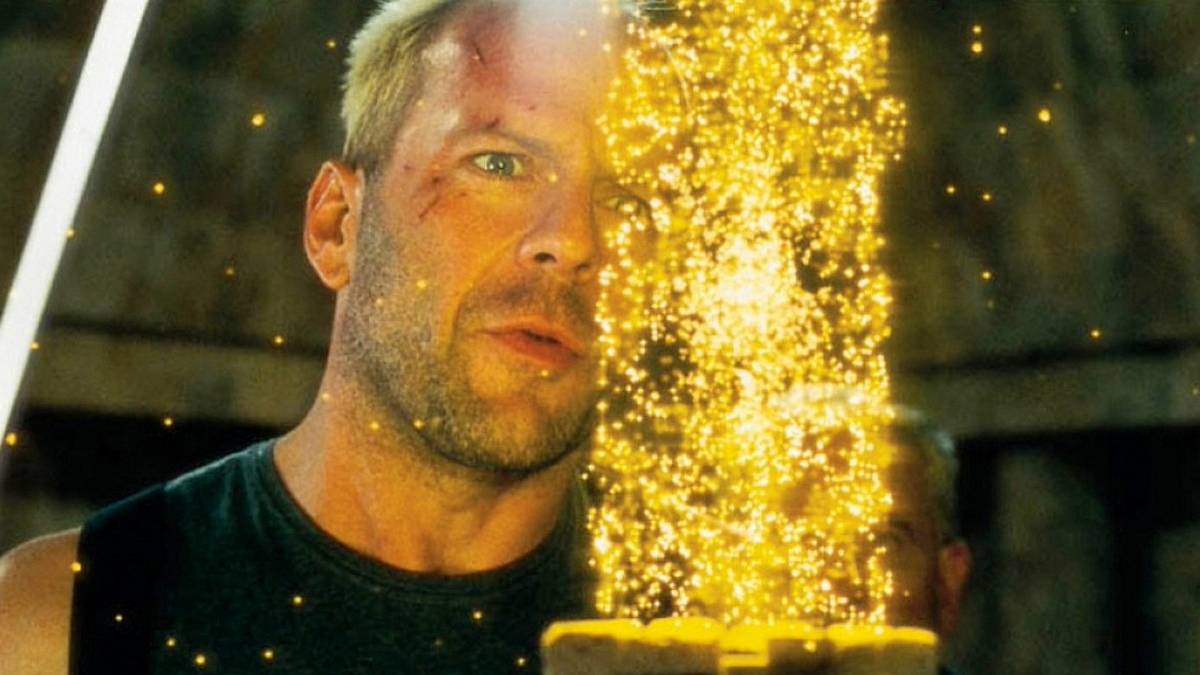Luc Besson’s The Fifth Element is arguably one of the most famous cult classics in history, earning both prestigious prizes like the BAFTA and César awards as well as a Golden Raspberry nomination for Milla Jovovich. Despite its cult status, it earned more than three times its production budget. The Fifth Element also became one of the most controversial movies of the year, receiving equal parts praise and criticism when it was released in 1997. That said, it is these very contradictions that make it both a fun watch and a cinematic landmark. While Jovovich’s Leeloo takes center stage in the movie, most fans would agree that Bruce Willis played an equally important role.
Willis’ Korben Dallas takes every step of the way on Leeloo’s journey — especially at the end of the story, when Dallas’ love for Leeloo allows her to transform into the titular fifth element. Mildly misogynistic tropes aside, The Fifth Element occupies a special place in the annals of pop culture. There have been rumors swirling around a potential sequel for years, even after Luc Besson declared his disinterest in making one. Stranger things have happened, but fans are now realizing that any subsequent installments won’t have Korben Dallas. Bruce Willis’s neurodegenerative disease prevents him from taking on another role, and The Fifth Element sequel wouldn’t be the same without him.
Korben Dallas Was the Perfect Everyman Action Hero
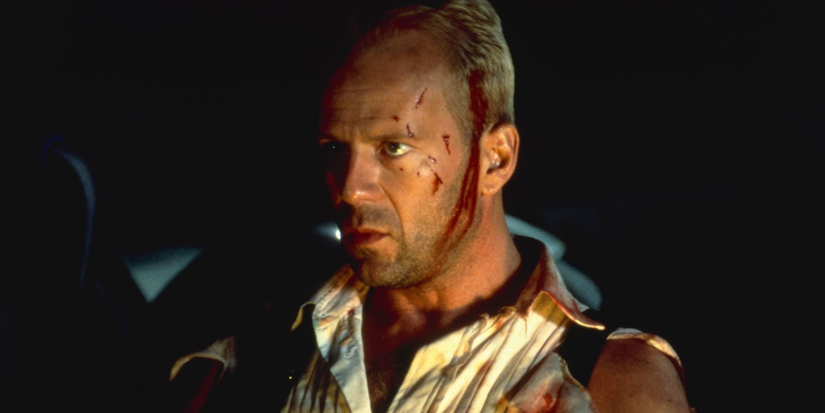
Bruce Willis in The Fifth ElementImage via Columbia Pictures
Action movies often rely on larger-than-life heroes, superhuman protagonists whose destinies inevitably take them toward greatness. From Sylvester Stallone’s titular Rambo and Keanu Reeves’ Neo to Tom Cruise’s Ethan Hunt and everyone who played James Bond, these individuals are naturally on a different level than every other character in their stories. Meanwhile, Bruce Willis made a career of becoming known as an everyman action protagonist, including some of his most popular roles — oil driller, trauma surgeon, and NYPD detective in Armageddon, Death Wish, and the Die Hard franchise, respectively.
The Fifth Element’s Korben Dallas embodies this archetype perfectly, with Willis playing a taxi driver in the chaotic society of 23rd-century New York. Dallas is initially depicted as an exhausted product of hyper-capitalism, limited to a tiny apartment and burdened by countless financial struggles. Although Dallas previously served planet Earth’s special forces as a Major in the Federated Army, he had already left his military career behind in favor of an equally exhausting profession. An ex-soldier now living in anonymity, Dallas was reduced to a life of dealing with annoying landlords. As such, the first step on his inevitable Hero’s Journey is completely accidental — Leeloo crashes through his flying cab and lands in the backseat.
In addition to the relatable tropes associated with Dallas’s completely ordinary character, The Fifth Element also frames him as a fallen hero who would rather live freely than get involved in cosmic schemes. And yet, Leeloo’s presence and nature gradually erode Dallas’ resistance, slowly transforming his character from an unwilling chosen one to an inspiring hero. He may not be an excellent fighter, especially considering his realistically rusty military skills, but Dallas’ unstoppable grit keeps him going even when viewers believe that he’s going to fail. In fact, it’s his frustrations and vulnerabilities that make him such an endearing character.
The movie’s comedic style, steeped in slapstick absurdity, is the perfect vehicle for Dallas’ sarcastic wit — a credible response to the increasing bizarreness of his situation. Although he’s hardly a comic relief character, Dallas’s sense of humor showcases his simplicity and reinforces his normalcy. Willis captures the hero’s weary banter and hilariously deadpan responses, which simultaneously elevate and undercut his own skepticism about Leeloo and the looming threat posed by the Mondoshawans. By the end of The Fifth Element, Dallas solidly demonstrates the potential latent within the everyman cliche and, by extension, within literally anyone else.
Dallas Was the Emotional Anchor for a Surreal Universe
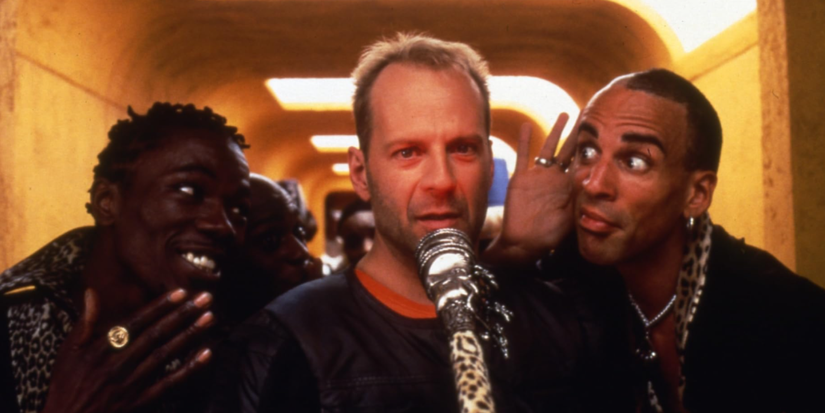
Bruce Willis, Carlton Chance, and Stewart Harvey-Wilson in The Fifth ElementImage via Columbia Pictures
The Fifth Element is an explosively eccentric cocktail — from exaggerated fashion styles and alien arias to unpredictable tonal shifts and atmospheric flamboyance, the film could have crumbled under the heavy weight of its own surrealism. A movie with so much hyperbole needed an emotional anchor for two reasons: to keep the story from losing itself and to function as a point of relatability for viewers. The intergalactic stakes undergirding The Fifth Element are firmly held in place by Korben Dallas, who provides a thoroughly human perspective for all the relentless weirdness of the 23rd century.
Individuals like Chris Tucker’s Ruby Rhod and Gary Oldman’s Jean-Baptiste Emanuel Zorg, not to mention the alien Diva Plavalaguna, are far too hyperbolic to offer emotional grounding. This forces Korben Dallas to serve as the audience’s surrogate — the only main character in The Fifth Element whose emotions are recognizable. When Leelo lands inside his taxi, Dallas briefly considers her beauty before his thoughts are taken over by his weakening license and the damage caused to his cab. At first, Dallas is more worried about his present than the future, even if he has the power to change it.
Outrageous characters in The Fifth Element thrive because they are contrasted with the plainness of Korben Dallas’s blue-collar personality, ambitions, and choices. And yet, Dallas doesn’t lose his everyman quality even after he understands the sheer scope of the stakes involved in Leelo’s character arc. The movie continues to retain its narrative clarity because Dallas remains true to himself throughout, no matter how deeply involved he becomes in the increasingly outlandish plotline. That being said, Dallas’s romantic relationship with Leeloo is arguably the film’s most powerful and relevant emotional anchor.
Bruce Willis and Milla Jovovich Had Fiery Chemistry
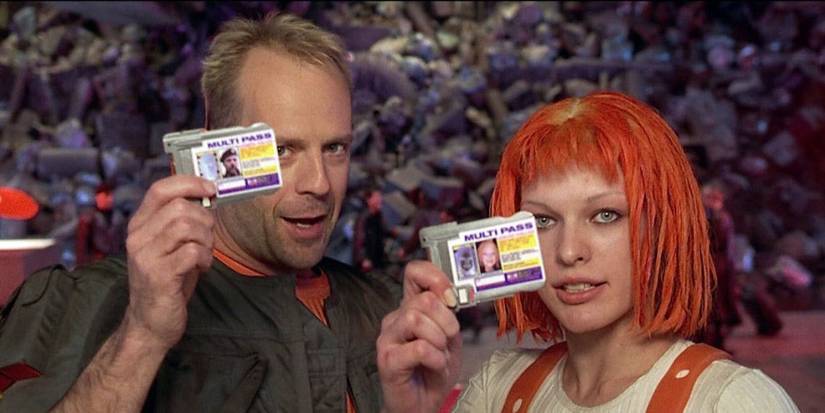
Bruce Willis as Korben and Milla Jovovich as Leeloo hold up their IDs in The Fifth Element.Image via Columbia Pictures
Milla Jovovich found her breakthrough role in The Fifth Element, consequently allowing her to stretch her acting wings in iconic franchises like Resident Evil. Jovovich’s Leeloo — a highly volatile blend of innocence, perseverance, and incomparable strength — would have been adrift without a counterpart capable of balancing her character out. Pairing Leeloo with Korben Dallas highlighted both their contrasting personalities while also revealing just how much both of them wanted to make emotional connections. As it turned out, Dallas and Leeloo soon began to understand each other on a profound level.
Bruce Willis and Milla Jovovich share a chemistry that can best be described as chaotically combustible, despite the actors’ 20-year age difference and the characters’ radically different perspectives. Dallas’ pragmatism and toughness were excellent juxtapositions to Leeloo’s naivety and alien fragility, effectively kindling a fiery romance between them. Their bond, strengthened in the crucible of shared trauma, feels as urgent as it does believable. At the same time, The Fifth Element prevents Leeloo from becoming yet another victim of the damsel-in-distress trope without weakening her dependence on Dallas.
Leeloo and Dallas share several scenes of physical intensity, including action sequences with wildly unique combat styles blending together. However, fans most remember the pair’s moments of affection and passion. Leeloo’s touchy nature throws Dallas off, but he quickly moves past his hesitation after developing feelings for her. Meanwhile, Dallas’ declaration of love helps Leeloo latch on to a beacon of hope shining through the darkness of cosmic despair, allowing her to defeat the Great Evil with her divine light.
The final scene of The Fifth Element is particularly noteworthy, as it culminates the relationship between Leeloo and Dallas — they actually make global dignitaries wait for them to finish having sex in a recovery chamber. In short, the film succeeds largely because it’s hinged around this iconic duo.
Could The Fifth Element’s Sequel Work Without Willis?
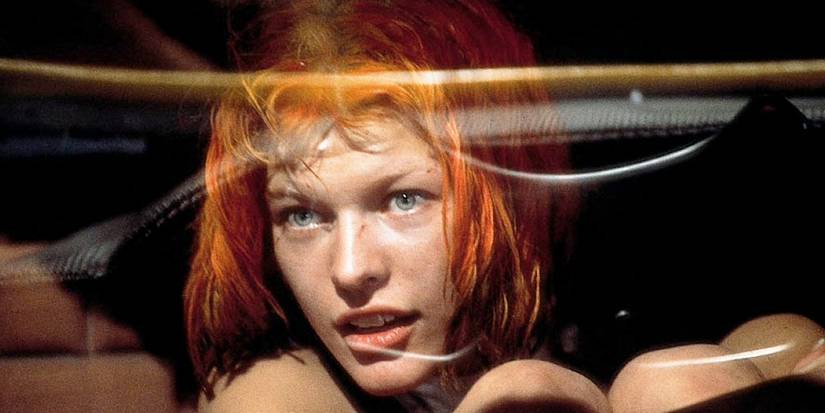
Leeloo looks out a spaceship window in The Fifth Element Image via Columbia Pictures
The Fifth Element’s pop-cultural legacy remains alive to this day, with the movie’s overarching ambience of absurdist surrealism feeling more like a product of the 21st century than the 1990s. Despite numerous complaints and criticisms from both critics and audiences, Bruce Willis and Milla Jovovich revealed their favorable opinions on the film and its making. More importantly, Jovovich recently teased her interest in a Fifth Element spin-off, potentially suggesting that she’s ready for a sequel. Unfortunately, any future installment will exclude Bruce Willis, whose frontotemporal dementia has left him unable to continue acting.
The Fifth Element’s sequel, demanded by the fandom for decades, could theoretically work if Willis’s everyman character is replaced by a similar actor. At the same time, balancing a new performance against those that fans have loved for years might end up with mediocre results. Korben Dallas is as important to The Fifth Element as the literal fifth element, Leeloo, forming one-half of the narrative’s connective tissue. Although Dallas’ redemption arc was completed by the movie’s conclusion, fans can’t picture anyone other than Bruce Willis with Milla Jovovich in that recovery chamber. In this case, not having a sequel might actually be better for the legacy of The Fifth Element, no matter how much the fandom wants one.

